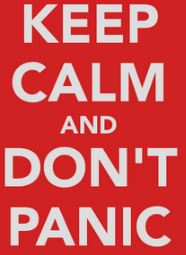I am 75% of the way through the Education and Innovation program and I'll be honest, the classes have been a mixed bag. I was looking for a program that would be useful to my current career in educational sales, but build on my previous experience as a middle and high school teacher. The coursework has done those two things. But, I'll be honest again, several of the topics have talked about the definition of innovation and demonstrated some semi-new apps and software, but generally the classes have been more focused on education than innovation, and almost rarely have connected the two.
But then we started the capstone class and we're currently two weeks in. And I'll be honest, it is kind of scary. I'm pretty sure I'm only understanding about 60% of what I'm reading and viewing. For someone that has been involved with teaching for over 20 years, I'm freaking out a little. But... I am also very excited because we are jumping into the world of innovation with both feet. Blockchain, cryptocurrency, and digital ledger technology were terms that I had NEVER HEARD OF until two weeks ago and I still don't think I can effectively explain any of them (but I'm getting better, though I'm sure my wife is tired of hearing about them). But they ARE innovative and they are the future of not only education, but the future as a whole.
So how am I managing my educational panic. I'm clinging to important repeated words in the course material like democratization and trust. I'm also remembering that our professor, Dr. Rodney, keeps reminding us that this is very new technology and it is just evolving. I think about Matthew Roszak explaining that just like when the internet started "95% of this could go sideways" but that tokenization allows for "participation rights" for everyone.
And the piece of advice I cling to most of all is from an early course in the program, Creativity and Innovation with Dr. Vlad Glaveanu. This was the first course where the content really started to dig into the definition of innovation and what the qualifications were for something being innovative. One of the resources for the course was a Ted Talk from Guy Kawasaki entitled, The Art of Innovation. During the presentation he listed eleven points involved in innovation. And the one that I remember and I have been thinking about as I work to understand the content for this course is "don't worry, be crappy." What he meant by this was that, don't worry about getting it perfect the first time. Embrace the imperfection because whatever you do is going to be better than what you had before you tried. So that's what I keep hanging on to, because I
will be better with the knowledge gained, even if I don't understand 100% of it and even if the technology is new and changing.
References
Kawasaki, G. (2014, February 22).The Art of Innovation. [Video]. TED.
Roszak, M. (2017, October 31). The Tokenization of Things.[Video]. TED.
Photo credit: Cision News

You absolutely are not alone! I keep thinking about what I teach my students who get upset when they don't understand a new concept: it's okay to make mistakes and not get it right away - it means your brain is growing! Well, I suppose six year old brains adapt and grow much easier than my 40 year old brain but it is a good reminder that discomfort and confusion is a normal part of learning new things.
I like how you mentioned that you've been trying to talk about blockchain and DTL with your wife. Explaining what I am learning to someone else often helps my own understanding and it is not something I have tried yet with this new concept so it was a good prompt for me.
Hi Steven,
I appreciate your sharing your honest assessment of your Education and Innovation journey here. I will hazard a guess that most of us feel (or have felt) similarly, as is characteristic of the disruptive nature of the innovation process. I also remember that talk from Guy Kawasaki and what a sense of relieve it inspired in me. That, and studying the whole premise behind the design thinking process, which is to iterate often (and even invite failure along the way) with the understanding that those bumps and starts are a necessary part of our never-ending quest for the next innovative solution. Luckily, we are not alone as we struggle to wrap our heads around these new understandings together.
Your blog post first made me laugh and then made me realize I'm not alone! The last 8 months have been a whirlwind for me in the Innovation & Education program. However, I have a much different perspective where I have often yearned for more applications of Education and less technology. I too have never heard of DLT before, though cryptocurrency is vaguely remembered from a news program. Thanks for sharing the TedTalk videos. I can't say that I understand the idea of cryptocurrency or digital tokens any better, but I will try to "Keep Calm"!